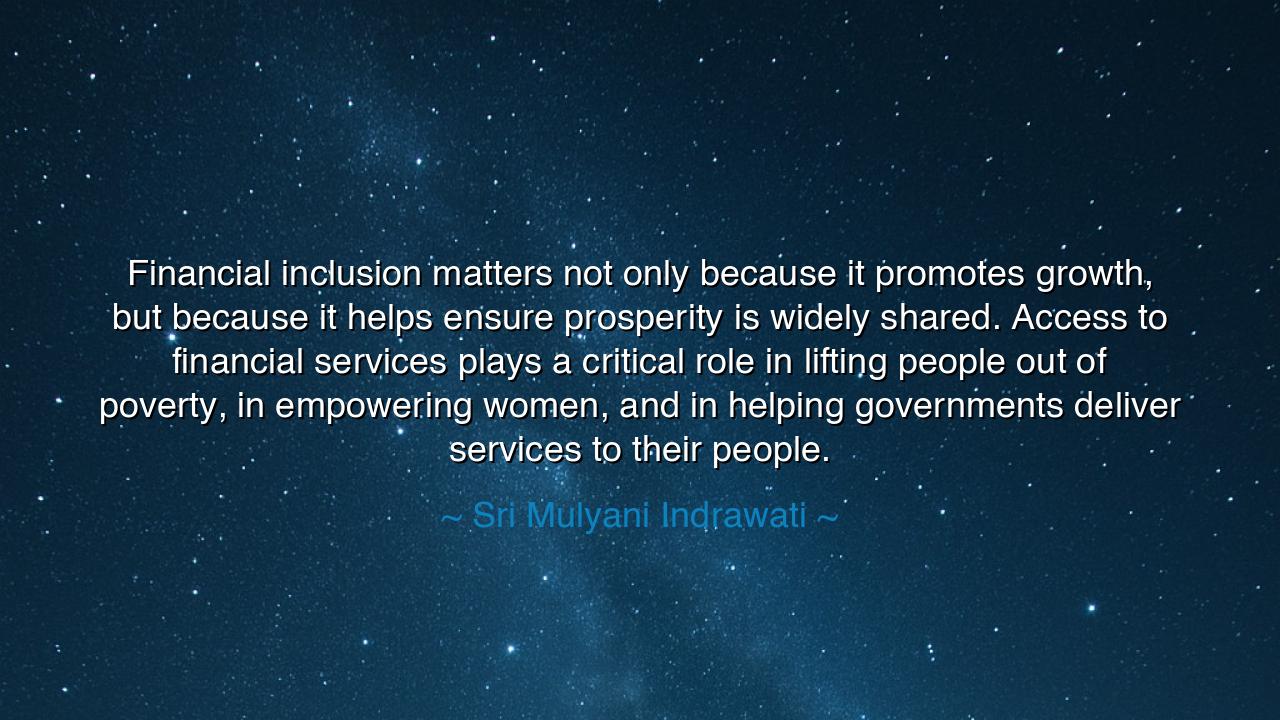
Financial inclusion matters not only because it promotes growth
Financial inclusion matters not only because it promotes growth, but because it helps ensure prosperity is widely shared. Access to financial services plays a critical role in lifting people out of poverty, in empowering women, and in helping governments deliver services to their people.






The words of Sri Mulyani Indrawati, a steward of nations’ wealth and a guardian of justice, carry the weight of both reason and compassion: “Financial inclusion matters not only because it promotes growth, but because it helps ensure prosperity is widely shared. Access to financial services plays a critical role in lifting people out of poverty, in empowering women, and in helping governments deliver services to their people.” This is no mere calculation of economics, but a declaration of equity, reminding us that true prosperity is not measured in towers of gold, but in how widely its blessings flow among the people.
The ancients knew this truth, though they clothed it in other names. In the laws of Solon of Athens, debts were forgiven and the enslaved were freed, for the wise lawgiver understood that without inclusion, the city would devour itself in greed and unrest. Where wealth gathers in the hands of the few, freedom withers; but where the means of sustenance and growth are shared, peace and loyalty take root. So too Indrawati declares that financial services—access to credit, to savings, to fair markets—are not luxuries but the lifeblood of human dignity.
Consider the story of the Grameen Bank in Bangladesh. Founded by Muhammad Yunus, it gave microloans to women who had long been excluded from the realm of finance. With these small sums, they built businesses, fed their families, and sent their children to school. What armies and kings could not achieve, a simple act of inclusion accomplished—lifting millions from poverty and reshaping the destiny of a nation. This is the living proof of Indrawati’s wisdom: that access to financial tools does not enrich only the pockets, but empowers the soul.
Her words also speak to the power of women, long denied the keys of economy and authority. When women are entrusted with resources, they multiply them for the good of all—investing in their children, their homes, and their communities. Thus, financial inclusion is not merely economic reform; it is the breaking of chains, the recognition that half of humanity must not stand outside the gates of prosperity. In empowering women, societies empower themselves.
Let the generations remember: growth without justice is fragile, and wealth without inclusion is barren. To lift the poor, to empower the silenced, to give governments the means to serve their people—this is the path to lasting peace and flourishing. Indrawati’s wisdom is clear: financial inclusion is not a side path but the very road to shared destiny. Where all have access, all may rise, and where all may rise, no one need be left behind.






HHNguyen Lam Huy Hung
Financial inclusion is indeed critical for economic growth, but I wonder if it’s enough on its own. How do we ensure that this inclusion translates to real empowerment for all individuals, particularly those in underprivileged sectors? Can financial tools like credit or savings accounts truly foster long-term prosperity, or do we need to provide complementary resources such as education, healthcare, and infrastructure for these systems to thrive?
TTNguyen Thanh Tien
Indrawati's emphasis on financial inclusion as a tool for shared prosperity is compelling, but how can we make sure that financial services are accessible to all, especially those who are often left behind, like rural farmers or people with disabilities? Is there a risk that the push for financial inclusion could end up benefiting the wealthy more than the poor if access isn’t equitable? What are the safeguards against this?
BNBich Ngoc
This quote highlights a key truth: financial inclusion can indeed help governments deliver services and combat poverty. However, what happens when the financial services are poorly designed or inaccessible to certain groups, such as rural populations? How can governments ensure that financial services are accessible to all, especially in areas with poor infrastructure or where digital services aren’t widespread?
MManhmanh
I completely agree with the quote’s assertion that financial inclusion can empower women. However, what are the potential risks? In some cases, women who gain access to financial services might face cultural or societal resistance that limits their ability to fully utilize these services. How can we build support systems and address these challenges to ensure financial inclusion truly empowers women, particularly in conservative societies?
MVBinh Minh vu
The idea that financial inclusion can lift people out of poverty is powerful, but it raises an important question: Can access to financial services alone truly overcome the complex barriers that poverty creates? In many regions, even when people have access to financial tools, they might lack education, infrastructure, or support systems. How can we ensure that financial inclusion works hand-in-hand with these other factors to be truly effective?